“Eco vacationers” engage in cutting-edge environmental research
Growing numbers of “Eco vacationers” engage in cutting-edge environmental research
My Fabulous, Virtuous Vacation
Jeff Greenwald, OnEarth Magazine
October 24, 2006
Why fritter away the hours just lying on a beach somewhere when you can have your fun in the sun — and help save the planet.
There is a species of vacationer who, like me, cannot do what vacationers are meant to do: relax. I am incapable of lying on a beach and sipping an umbrella drink while listening drowsily to reggae hits. I need to be doing something. And given the deteriorating state of our planet, I would prefer it be something useful.
This is not about moral strength. It’s simply a case of obstinate curiosity, and a certain kind of incurable restlessness.
For people like me, there exists the “volunteer vacation.” Habitat for Humanity is among the best-known organizations to arrange such trips, but there are others whose missions focus on environmental rather than social causes. Global Vision and the Earthwatch Institute, for example, offer motivated travelers the opportunity to transport their curiosity and energy to exotic locales.
“Hands-on participation is key,” says Ann Ogilvie, Earthwatch’s program manager for earth and marine sciences, over a breakfast of squid salad in Thailand’s Koh Chang National Park. An experienced scuba diver, Ogilvie has come to join our volunteer team and to evaluate our work over the next eight days. Our mission marks the first time Earthwatch has sent a group of volunteers to assess the health of Thailand’s coral reefs. We’ll do our surveys underwater, snorkeling and scuba diving, collecting data on the reef ecosystem. “We’re actually engaging people in cutting-edge research,” she says.
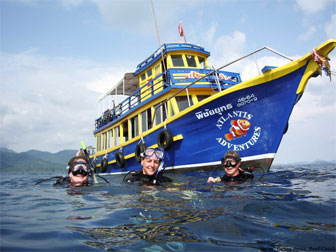 The Atlantis Adventures dive boat with Anne, Jernnifer, and Jeff in the water, prepared for a ReefCheck dive. Photo by Georg Heiss |
Ten more teams will continue our work this year, and others are scheduled for 2007. Our goal is to lay the groundwork: get a feel for the equipment, decide which reefs are good candidates for surveys, and develop a sense of what future teams might accomplish. If all goes well, this will become a long-term program. It’s inspiring — if a bit daunting — to realize we’re standing on square one.
Earthwatch, based in Maynard, Massachusetts, has been around since 1971. Its mission, says Ogilvie, is to “support scientific re-search through volunteer contributions — and not only financially.” About 4,000 people sign up each year to collect data everywhere from rainforests to savannahs to coral reefs. Expeditions range in duration from 2 to 21 days, and in cost from $495 to more than $4,000 (and it’s tax deductible). Airfare is not included, but most other costs — like food and accommodations — are. Some trips, like ours, are for divers. But most cast a broader net, and some, like “Coastal Ecology of the Bahamas,” cater specifically to families. There’s even a turtle-monitoring trip to Trinidad for teens.
Earthwatch’s Thailand trip is a partnership with Reef Check, based in Pacific Palisades, California, a nonprofit organization that has devised a standardized method for gauging the health of the world’s endangered coral reefs. The concept is irresistibly simple: Recruit scuba divers all over the world and teach them how to perform relatively simple surveys of dive sites. Since Reef Check’s creation in 1997, hundreds of volunteer teams have monitored some 1,500 reefs in more than 60 countries. Once the data are compiled and analyzed, Reef Check advises host countries on reef management and protection.
This particular trip intrigues me for another reason: I learned to dive in Thailand, in 1986. It seems only right to give back to the reefs that inspired my love of the sea. (Okay, maybe I am a moral giant.)
Ogilvie and I, along with another volunteer and two marine scientists — Reef Check’s Europe director, Georg Heiss, and Thailand coordinator, Kim Obermeyer — wash down our squid salad with instant coffee. We’d hoped to get an early start on our first morning, but we’re waiting for the arrival of half a dozen local residents who will be trained to take over the surveys once Reef Check scientists move on to new reefs.
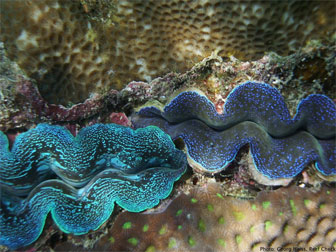 Colorful clams between boulders in Koh Chang Marine Park . Photo by Georg Heiss 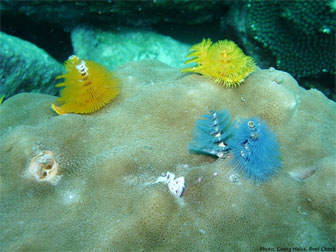 Christmas Tree worms on the rocks in Koh Chang Marine Park, Thailand. Photo by Georg Heiss |
Once everyone is assembled, Heiss and Obermeyer demonstrate the basics of a reef check. First we’ll mark our survey line by laying a 100-meter tape along the chosen reef. Breaking into teams of two, we’ll perform three surveys: one for fish, one for invertebrates, and one for substrate (the rock, rubble, and live coral that make up the habitat). We’re looking for indicator species — fish and invertebrates that, by their presence or absence, provide clues to a reef’s health.
“Too many sea urchins? The area may be [polluted by] sewage, or have a lot of natural nutrients,” Heiss says. “Very few butterfly fish? When there’s not enough healthy coral, they vanish. No lobster, parrot fish, or grouper? Those are signs of severe overfishing.”
We’re lucky on this trip: our accomocationss are spacious bungalows at a seaside resort owned, we’re told, by former pirates. Ogilvie takes pains to inform us that air-conditioning and private patios are not the Earthwatch standard; future volunteers will likely have far more rustic rooms, possibly on one of the outlying islands. (Delicious Thai meals, though, are standard fare.)
We set out each morning on the Calypso, Obermeyer’s custom-built wooden dive boat. There’s a sense of gleeful camaraderie, and a slight adrenaline buzz, among the explorers. The high, sharp islets of Koh Chang National Park — fossilized coral reefs that once formed an ancient seabed — rise up around us, covered with lush jungle. White eagles circle overhead. The days are hot, but high clouds parading over the Gulf of Thailand provide some relief.
The surveys themselves are challenging. There’s a world of difference, I discover, between sport diving and research. An hour underwater passes quickly on a recreational dive, but continually recording data along a 100-meter survey line is like, well, work. Sight-ing the occasional snapper or giant clam provides a burst of satisfaction. After the dive I experience a sense of relief: Pulling off my scuba gear feels like taking off a business suit.
That night at dinner, we dig into a plate of small but tasty reef fish. “What we’re eating,” Heiss remarks, “is the result of overfishing.” He’s right: I saw almost no big fish during our dive.
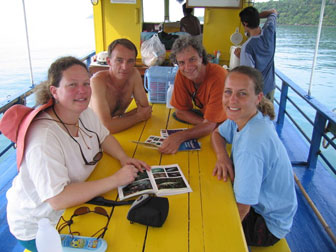 Anne, Georg, Jennifer and Jeff aboard the Atlantics Adventures dive boat in Koh Chang, Thailand. Photo by Georg Heiss 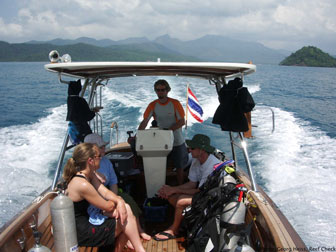 Kim Obermeyer pilots his dive boat on the way to a ReefCheck survey. Photo by Georg Heiss 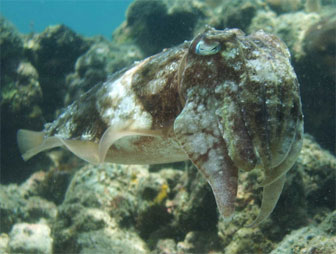 A cuttlefish surveys the rocks for lunch at Koh Chang Marine P. Photo by Georg Heiss |
I’m not yet confident identifying fish (except bright yellow butterfly fish, which anyone can spot with accuracy). The invertebrate hunt was easier-they don’t move around so fast-but not without its own pitfalls. In one zone I counted 62 Diadema urchins, while Heiss recorded 120. Reef Check’s margin of error, I suggest, must be huge. Heiss and Obermeyer assure us otherwise. So much data will be collected, they say, that accurate trends will emerge despite inevitable inaccuracies.
Maybe it’s not perfect, but short of dropping a net around the reef and counting everything, there’s no faster way to assess the health of a marine ecosystem.
By night the island is quiet, and the moon is high. It feels pretty late. I ask the time. “Eight-thirty,” Heiss says. “What am I going to do for the next two hours?” I yelp. Fortunately Ogilvie has brought the answer: Yahtzee.
The days pass. Our surveys are fun, and we even squeeze in a few recreational dives, hovering among huge schools of cardinal fish, barracuda, and psychedelic Christmas tree worms. Sometimes, though, the amount of time spent on logistics is frustrating: preparing the Calypso, motoring out to another island, dropping anchor, taking GPS readings, gearing up. We don’t even know if a reef is worth surveying until we’ve investigated with snorkels.
On our last day, we’re enjoying pad Thai noodles when Obermeyer rattles a glass of ice to get our attention. He is eager to put our work in perspective.
“During the time you’ve been here,” he says, “we have visited eleven reef sites and surveyed four of them. Nine people were trained in the Reef Check protocol, and plans were made to run a summer camp at the local school, so we can teach children about reef ecology. Three local residents were interviewed about the history of these reefs: everything from major storms to trade for the aquarium industry.” And, he adds, “we ate a total of 37 squid dishes.”
Put in those terms, our achievement indeed sounds impressive.
In a Thai tradition called a wai, an offering is made to an image of the Buddha. As part of the ritual, a gossamer square of gold leaf is pressed onto the statue. Though seemingly insubstantial, the tiny offerings add up. After many years of devotion, some images are completely overlaid with gold.
Driving toward the ferry that will take me back to the mainland, I apply that observation to my experience. Our contribution may have been small, but small contributions add up. Someday, our work will help the government develop strategies for conserving this fragile ecosystem. That information will be worth its weight in gold — and we’ll have applied the first little squares.
Further resources
Jeff Greenwald is a California-based travel and science writer whose work has appeared in Salon, Wired, and Outside. Jeff is also Executive Director of Ethical Traveler, an international alliance of dedicated to preserving the environment and protecting human rights: http://www.ethicaltraveler.org. His article, “My Fabulous, Virtuous Vacation”, first appeared in the Fall 2006 issue of OnEarth, a publication by the Natural Resources Defense Council, and has been posted with his permission.
Jeff maintains a blog at http://www.jeffgreenwald.com/